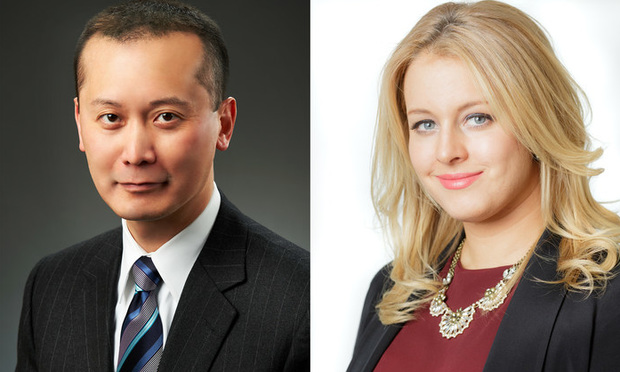Edward T. Kang

May 18, 2023 | The Legal Intelligencer
Officers and Directors Should Seek Mandatory Advancement ProvisionNot all indemnification and advancement rights are created equal. While many companies provide broad and mandatory advancement rights to covered persons, some companies provide permissive advancement rights.
By Edward T. Kang
9 minute read

April 13, 2023 | The Legal Intelligencer
When Is Knowing 'Knowing' in FCA Cases? High Court Examines Two CasesThe Supreme Court is taking up two U.S. Court of Appeals for the Seventh Circuit cases where rulings shielded both food-and-pharmacy chains from FCA liability for alleged improper billing involving prescription drugs. If the high court sides with the Seventh Circuit, the impending result could mean an exponential loss of taxpayer money.
By Edward T. Kang and Kandis L. Kovalsky
10 minute read

March 09, 2023 | The Legal Intelligencer
Tort Claims Between 2 Contracting Parties May Overcome the Gist of Action DoctrineEarlier last year, the U.S. Court of Appeals for the Third Circuit in SodexoMAGIC v. Drexel University made this law—that the gist of the action doctrine does not bar a viable tort claim between two parties just because the parties papered the social duty giving rise to a tort claim into a contract—abundantly clear. Yet, many courts in Pennsylvania continue to misapply the doctrine.
By Edward T. Kang
10 minute read

January 19, 2023 | The Legal Intelligencer
The Noncompete Agreement: Is It a Thing of the Past?Recently, the Federal Trade Commission (FTC) has proposed a rule, which would ban the use of noncompetes almost completely and require existing noncompete agreements to be rescinded. This comes with inherent legal challenges and has a broad implication for employers in the business community and their litigators.
By Edward T. Kang and Kandis L. Kovalsky
8 minute read

January 05, 2023 | The Legal Intelligencer
Sophisticated Schemers Beware: Civil RICO Expands Creditors' ArsenalThose plaintiffs counsel practicing in the Third Circuit should rejoice in knowing that RICO provides a powerful tool for creditors against debtors using fraudulent means to avoid paying.
By Edward T. Kang
8 minute read

December 01, 2022 | The Legal Intelligencer
Fighting Fraud in Health Care Through the False Claims Act in the Third CircuitThe Third Circuit has adopted a more plaintiff/relator friendly interpretation while the Eighth Circuit has reached the opposite conclusion. Until the U.S. Supreme Court settles the circuit split, choice of venue is key for those bringing claims under the Anti-Kickback statute.
By Edward T. Kang and Kandis L. Kovalsky
8 minute read

November 10, 2022 | The Legal Intelligencer
Circuit Split on Materiality Standard in FCA Cases and Choosing the Right VenueA smart and tactical choice of venue can set the stage for victory, and in a False Claims Act case, that choice may make all the difference.
By Edward T. Kang
8 minute read

October 13, 2022 | The Legal Intelligencer
The Great Pandemic Heist: Attorneys' Role in Fighting PPP Loan FraudIn the COVID-19 era, there has been a heist of great value, but it has not gone undetected. Prosecutors have called the heist the largest fraud in U.S. history, with the thieves stealing hundreds of billions of dollars in taxpayer money through fraudulently obtained Paycheck Protection Program (PPP) loans.
By Edward T. Kang
9 minute read

September 22, 2022 | The Legal Intelligencer
The Disappearing Jury Trial and Its Affect on the American Legal SystemAn examination of the processes often undertaken to dismiss cases before trial, and the lasting effects that a decline in jury trials may have on the American legal system at large.
By Edward T. Kang
8 minute read

July 29, 2022 | The Legal Intelligencer
Individual Liability in the Opioid Epidemic: An Examination of Recent DevelopmentsThroughout the past decade, the country has been battling a raging epidemic and public health crisis: opioid addiction. In 2021, over 80,000 people died from opioid overdoses. Pennsylvania has one of the highest rates of opioid overdose deaths in the country. The crisis in Pennsylvania is so severe that it is decreasing the life expectancy in the commonwealth.
By Edward T. Kang
11 minute read
More from ALM
- Scan In Progress: Litigators Leverage AI to Screen Prospective Jurors 1 minute read
- Legal Speak at General Counsel Conference East 2024: Match Group's Katie Dugan & Herrick's Carol Goodman 1 minute read
- Legal Speak at General Counsel Conference East 2024: Eric Wall, Executive VP, Syllo 1 minute read



